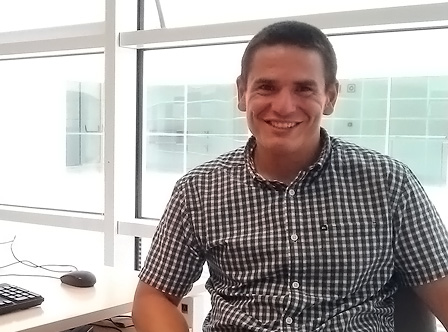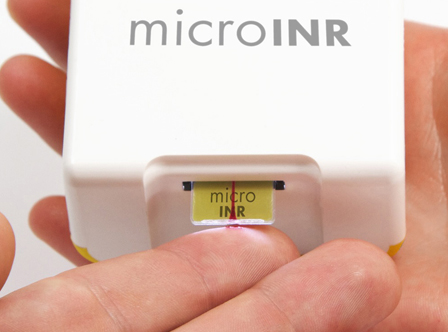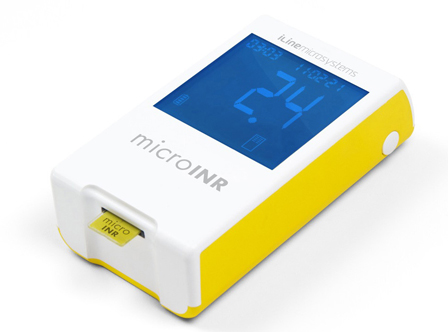INTERVIEW



Xabier Hernández is in charge of managing the whole technological side of the enterprise iLine Microsystems, a Basque SME in the microfluidics sector with medical objectives and which harbours great ambitions. In this interview, Hernández explains his collaboration with IK4-TEKNIKER’s Electronics Unit and CIC microGUNE to develop cutting-edge technology in his products.
1.- Your enterprise has received the Euskaltel award for the most innovative SME in the Basque Country. Is it possible to commit oneself to innovation in a small enterprise?
Innovation together with quality and teamwork are the values of iLine Microsystems. We firmly believe that small enterprises can and need to innovate.
Our activity focuses on developing and manufacturing innovative, dependable, easy-to-use devices for self-diagnosis and professional use. Using innovative technologies means that the devices developed are in line with market needs, which therefore boils down to high added-value solutions capable of competing internationally. The differential factor of the products developed by iLine Microsystems is built on innovation, technical knowledge and market needs.
2.- iLine has collaborated with IK4-TEKNIKER in the development of a number of its systems. What does each of the parties contribute in the joint development of a product or a technology?
iLine Microsystems is an enterprise with a high degree of expertise in microfluidic and biochemical design, bolstered by market knowledge that orientates development towards those with higher demand.
The developments carried out by iLine Microsystems incorporate biochemical processes on a disposable plastic base, while maintaining levels of efficiency and quality on a par with those of traditional laboratory tests and contributing advantages like rapid analysis and low cost.
Specifically, iLine Microsystems designs the biochemical reaction and the base on which it is going to take place. Once the physico-biochemical base for inspecting the relevant biochemical parameter has been established, IK4-TEKNIKER gets down to working on the conceptual design of the inspection system to be used to carry out this measurement; it starts with some prototyping phases in which the solutions are adjusted bilaterally according to the feedback of the iLine Microsystems researchers.
Basically, the most significant contributions of IK4-TEKNIKER to iLine Microsystems products have to do with specific knowledge in a whole range of disciplines like photonics, artificial vision, signal processing, algorithmics and HW, SW communications. The multidisciplinary team of IK4-TEKNIKER’s Electronics Unit, led by Jon Mabe, and CIC microGUNE provide support for the developments thought up by iLine Microsystems.
This relationship with the R&D centre is maintained over time, which means we get ongoing support in the verification, validation, certification and after-sales service phases of iLine Microsystems products.
3.- Electronics is destined to play a very important role in the biomedical sector in the future. How can local companies take advantage of the human and technological resources and knowledge of the R&D centres?
The decentralising of healthcare systems, the increase in the population and its average age, and lastly, the greater degree of familiarisation of patients with the new technologies point to a significant increase in homecare and Point of Care (POC) devices, like those developed by iLine Microsystems and IK4-TEKNIKER.
Electronics is an essential component in devices of this type, because it is the electronic system that undertakes to control the conditions of the biochemical reaction, to generate the stimulus for that reaction and, at the same time, has to pick up the signal generated by the reaction, process it and interpret it to generate, display and communicate information in a standard format that can be understood by patients and healthcare workers. The role of electronics (with its associated algorithmics) is also essential when it comes to applying quality controls or traceability systems required in POC-type solutions that have to work autonomously.
However, we mustn’t forget that the healthcare sector demands very high levels of quality, due to regulatory as well as commercial requirements; this means that the levels of dependability and robustness demanded of electronic solutions applied to electromedical equipment and healthcare products tend to be very high, and this has an impact on development times.
Finally, the local enterprises that want to develop in the biomedical sector will be able to rely on the multidisciplinary knowledge of the R&D centres for the development of their devices; the centres have experience in having worked previously in accordance with various regulatory frameworks.
4.- What are iLine’s next challenges in the medium term, and what role is the incorporation of new technology in the company’s future going to play?
The first challenge we have is that we have to go on internationalising the product. We are already present in several countries but there’s still a long way to go. We are also working on a possible diversification of applications, but always in the world of in vitro diagnostics, which we know and master
Our aim is to turn ourselves into a leading reference in the POC in vitro diagnostics market share through the constant quest for innovative, dependable, affordable, user-friendly devices. We are also keen to develop a modern, professional organisation that is open to the global market, customer-centred and with the firm commitment to work to the highest standards of quality.
Ours is a people-based project with transparent corporate policies driven by positive professional ethics. We are committed to society and healthcare matters.



